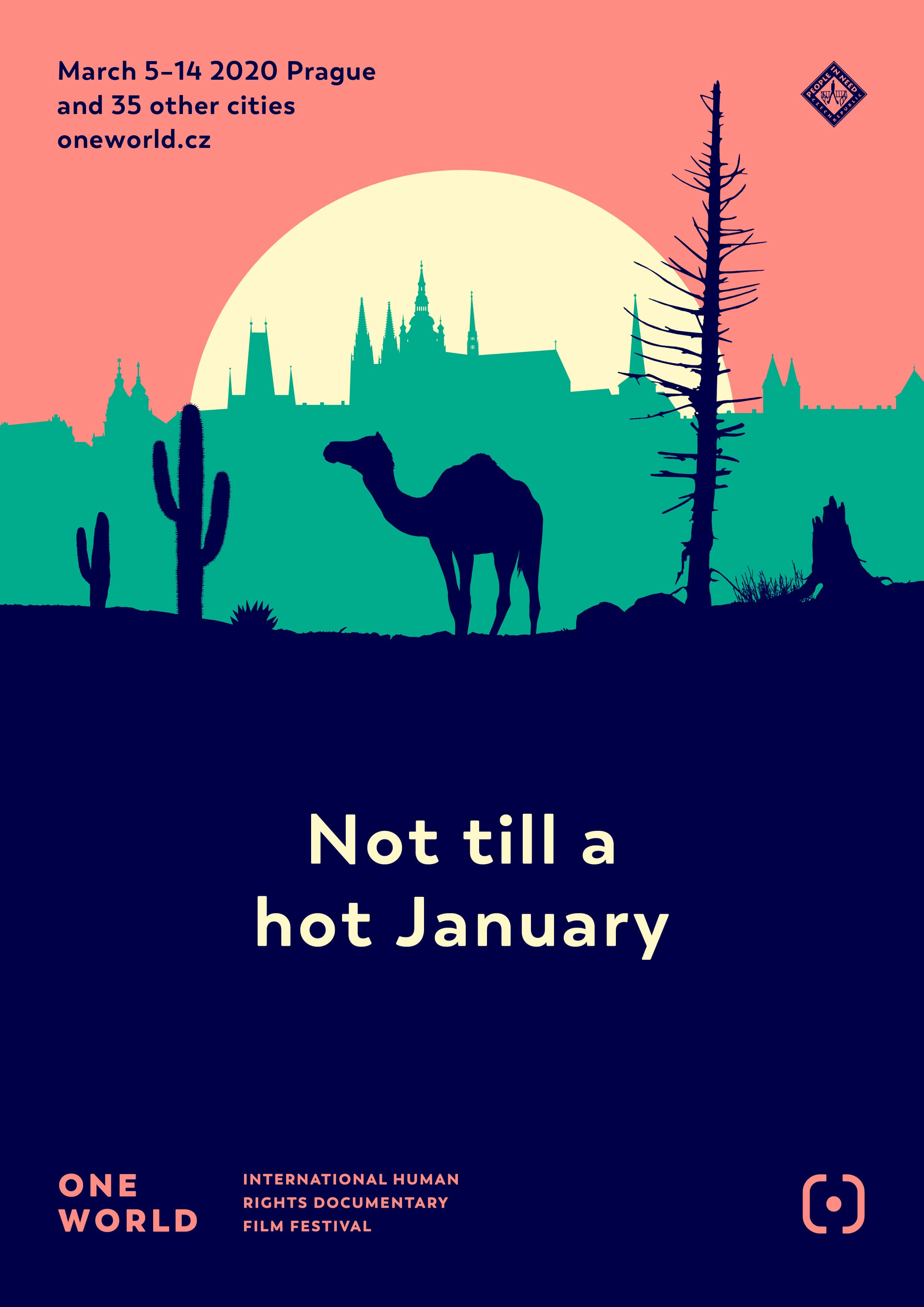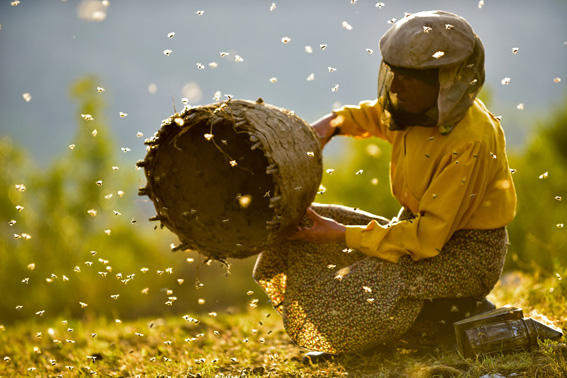
Prague, 5 March 2020 – This evening marks the start of the 22nd edition of the One World International Human Rights Documentary film festival. This year’s motto – “Not till a hot January” – describes one of the core characteristics of climate change, specifically that, because of rising temperatures and poor management, the landscape cannot retain water. With our “films (not only) about the climate crisis, we want to show the global dimension of the entire issue, but mainly focus on its impact at the local level. Our aim is not only to draw attention to it, but to inspire people to action,” explains Ondřej Kamenický, the festival’s director. One World will screen 133 documentaries from 60 countries, and will bring more than 130 festival guests to Prague.
Honeyland has been chosen as the opening film, and it will be screened this evening at Prague’s Lucerna Cinema. This internationally award-winning film, which was historically the first documentary to be nominated for an Oscar in the Best International Feature Film category, captures the life of traditional beekeeper Hatidze Muratova. It offers not only a glimpse of a vanishing trade set in the breath-taking mountainous scenery of North Macedonia but also a strong portrayal of the state of our civilisation.
The festival will occupy eight of Prague’s cinemas from 6 to 14 March, and, for the second year in a row, also the DOX Centre for Contemporary Art in Prague’s Holešovice district. This is where this year’s virtual reality projects – all focused on ecology and nature – will be presented. Visitors will be able to relocate themselves from the gallery to, for example, the forest, the desert, or the tip of an iceberg, or even catch a glimpse of a living hallucination of nature come to life, which is initiated by consuming the hallucinogenic Ayahuasca brew. The overall atmosphere will be complimented by a special nature installation designed by the Green Décor Studio.
One World has been addressing environmental issues more or less since the time the festival was first established, and during the past three years films on this subject have had their own category – UnEarthed – which was chosen as our main thematic category this year. Of course, this year’s edition includes the three traditional competitive categories (the Czech Competition, the International Competition, and the Right to Know Competition), and another thirteen additional thematic categories. You can choose films from the individual categories on the festival’s website; it’s also possible to browse the programme according to screening dates and times, or according to the individual venues.

This year, the festival is pleased to present the exclusive premieres of 27 films (21 have their world and international premiere, and 6 are being seen in Europe for the first time). There are 11 documentaries competing for first place in the Czech Competition category, of which 5 are enjoying their world premiere. The first of these is Apolena Rychlíková’s film The Czechs Are Excellent Mushroom Pickers, which tracks climate change in the Czech Republic through a research probe carried out by extra-terrestrials. Andrea Culková’s documentary Grief looks at climate change and the emotions it evokes, particularly in women. Then in Doggy Love, director Linda Kallistová Jablonská presents a portrait of musher Jana, who sets out with her team for Europe’s longest sled dog race – the Finnmarksløpet. Currently, Mongolia’s capital of Ulaanbaatar is home to one and a half million people (50% of the country’s entire population). When 50-year-old Tumurbaator arrives in the city, will his dream of a better life come true? Find out in Anji Sauvé Clubb’s Nomad Meets the City. In his film Town of Glory, Dmitry Bogolyubov follows Putin’s political crew to examine how they use the legacy of the Great Patriotic War to gain the support of the Russian people.
Additionally, this is the third year that One World includes the Talking Cinema series of special discussions. Experts from various fields will come to Prague and give lectures to accompany the screenings of selected films. UN Special Rapporteur Leilani Farha will discuss the worldwide problem of inaccessible housing. World renowned oceanographer and professor Stefan Rahmstorf will speak on the topic of climate change. And former Swedish Minister of Foreign Affairs Margot Wallström will discuss the role of women in politics both as it is and how it should be. All of the discussions will take place at Kino 35 and will be simultaneously interpreted from English to Czech; three of them will also be interpreted into Czech Sign Language.
The festival guests include not only well-known film directors, such as Feras Fayyad, who will sit on the International Jury and also present his Oscar-nominated film The Cave at the festival, but also many film protagonists. For instance, the participants in the post-screening discussions will include Lea Tsemel, an Israeli lawyer who defends Palestinian rights, the well-known artist Badiucao, who uses his art to criticise China’s totalitarian regime, and Danish war photographer Jan Grarup, who will also open his exhibition at the Audience Centre at the Tibet Open House during the festival.
Over the past three years, making the festival accessible to people with disabilities has become a matter of course. All of the documentaries, even those in Czech, have Czech subtitles for individuals who are deaf or hard of hearing. Four of the films will be screened with an accompanying audio description, and there will be three relaxed screenings which might be appreciated chiefly by people with a mental disability or difficulty concentrating. And last but certainly not least, we aim to increase the number of places accessible to audience members who use a wheelchair or have other mobility issues.
The youngest festival visitors and their parents will be able to take advantage of the Kid’s Corner for children 3 and up, located at the Municipal Library in Prague 1. It will be open every weekday from 2 pm to 8 pm, and, at weekends it will open at noon. Film workshops, led by teachers from the Free Cinema organisation, will be held at the Kid’s Corner on Fridays, Saturdays, and Sundays.
Practical information:
- This year the festival’s audience centre will once again be located at the Tibet Open House, in Školská Street in Prague. Here, visitors to the festival will have the opportunity to buy festival merch, relax with their children over a cup of coffee, or participate in one of the festival’s accompanying events.
- You’ll find the Press Centre, where we will be issuing press accreditations during the festival, on the first floor of the People in Need’s Langhans Centre (37 Vodičkova Street, Prague). It will be open from 5 to 14 March from 10 am to 8 pm.
- In addition to the box offices of the individual cinemas, tickets may also be purchased through the central assisted sales desk at the festival’s Infopoint in the Lucerna Passage.




